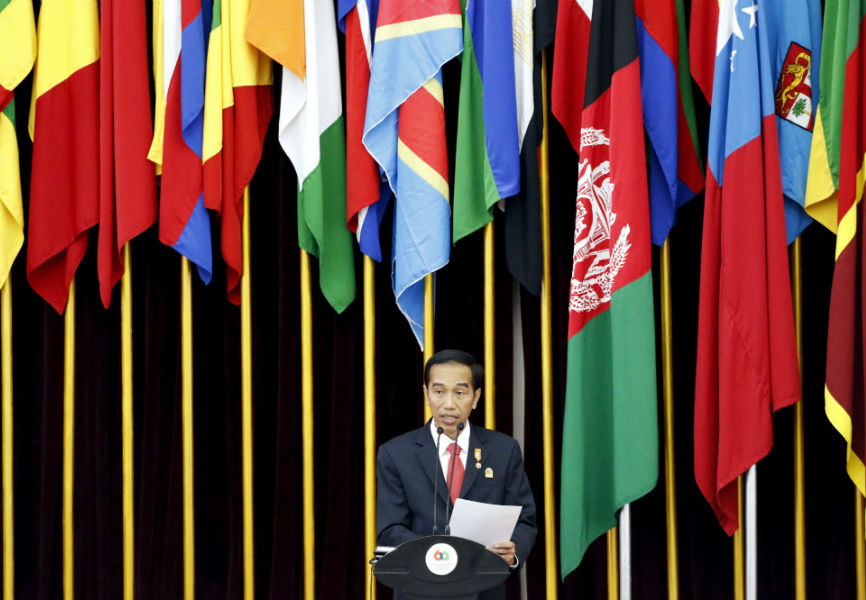Surveys indicate voters in the world's third-largest democracy will likely reelect President Joko Widodo (widely known as Jokowi) to a second term in office when they go to the polls Wednesday. Eurasia Group expert Peter Mumford explains the former businessman's appeal as well as other issues animating Indonesian politics, such as the increasing role of Islam.
What has Jokowi's track record been?
The president has maintained a steady job approval rating of around 70%. He scores considerably higher than most other Indonesian politicians in terms of public perceptions of trustworthiness and incorruptibility and has taken steps to allow the independent Anticorruption Commission to function more effectively. Remarkably, Jokowi has managed to maintain an image of political outsider despite being in high office for several years.
The president has made efforts to address concerns over the rising cost of living, lack of jobs, and more broadly, growing inequality. The data is mixed on whether inequality is widening, but regardless the public perception is that the gap between the richest and poorest is getting bigger. This is feeding populist sentiment, which has been exploited by Islamist groups. In response to these concerns, Jokowi halted the reform of fuel and electricity subsidies and froze administered prices for many food items, which combined with the actions of a hawkish central bank, has helped to keep inflation relatively low. He has also made more progress on high-profile infrastructure projects than his predecessors, such as the opening of Indonesia's first underground rail line a few weeks ago (after a decades-long wait). And healthcare services have been improved.
But the president has taken little action on addressing Indonesia's structural economic weaknesses, including lackluster investment and weak non-commodity exports—the latter contributes to a persistently large current account deficit that makes the economy vulnerable to international financial market volatility. Unfortunately, the prospect for action on these issues will remain relatively bleak if Jokowi is reelected.
How is the challenger Prabowo Subianto seeking to sway voters?
Prabowo is an ultra-nationalist who appeals to the more conservative and religious segments of the population, which include many younger voters. His campaign has been divisive, whipping up religious and anti-foreigner sentiment, in part because he lacks any policy solutions to the challenges facing the country. However, the opposition leader has failed to set out a vision that attracts moderates and liberals and has not given Indonesians a convincing reason why they should vote for change.
Nevertheless, if Prabowo defies the poll predictions and pulls off a surprise victory, political risks would rise, not least to the secular, pluralistic democracy in Indonesia. His government would take an (even) less welcoming stance toward foreign investment—though he might be more pragmatic than his off-color remarks on the campaign trail suggest—with negative consequences for economic growth.
What role will the increasing Islamization of politics and relations with China play in the elections?
Jokowi has in the past been susceptible to accusations by opponents that he is “insufficiently Muslim.” He was stung when mass protests by hardline Islamists resulted in the ouster and jailing for blasphemy of his protege and former Jakarta governor Basuki Tjahaja Purnama in 2017. Thus, as expected, Jokowi has an Islamist running mate, Ma'ruf Amin, to help shore up his conservative and religious flank. But even with this move, the president will not win the support of the most conservative and religious voters.
While Jokowi, as well as many other Indonesian politicians, have been taking pains to profess their religion more publicly, the rise of political Islam would accelerate if Prabowo defies the odds and wins the presidential election. Prabowo made a pact with hardline Islamists ahead of the election—that includes promising to rehabilitate Rizieq Shihab, the disgraced leader of the extremist group FPI, who is in self-imposed exile in Saudi Arabia—and his campaign has deliberately sought to drive a wedge between the Muslim majority and minority groups.
Relations with China won't have a big impact on the Indonesian poll, though this issue will remain a sensitive one given the read across to the country's ethnic divisions and its past battles with communists. After the election, Jokowi may feel slightly freer to form closer ties with China if he wins, less fearful of identity politics attacks. A Prabowo victory would see relations with Beijing deteriorate, as he has repeatedly tried to whip up anti-China/Chinese sentiment during his campaign.

 Indonesian President Joko Widodo. REUTERS.
Indonesian President Joko Widodo. REUTERS.
